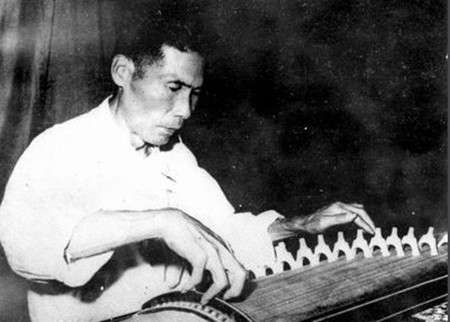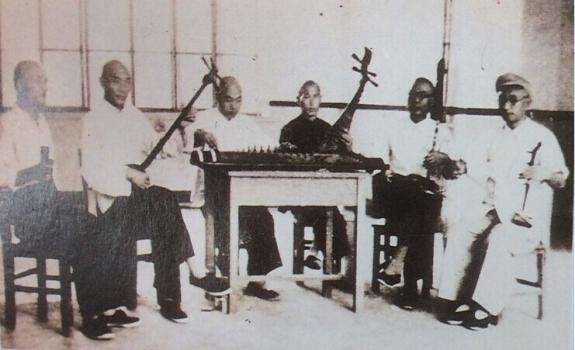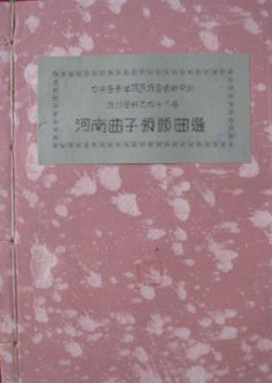Appreciation and Analysis of Classical Famous Songs of the 20th Century: Cao Dongfu and "High Mountains and Flowing Water"
Before Henan Zheng formed a genre, it was called Bantou Qu and Henan Zheng. Bantou Qu was originally a common name for Henan folk chorus ensembles played with sanxian, zheng and pipa. People called the early Henan Zheng Qu directly as Bantou Qu, implying that it was directly separated from the zheng music in the Bantou Qu ensemble. voice. The title of Henan zheng is a zheng used as an accompaniment or main instrument in the mid-20th century. It broke away from the environment of Henan local rap music major and bantou ensemble and entered a new context of professionalization and systemization in the college. After that, the genre was divided into "Zheng Solo" as the standard, and it was named according to the regional characteristics corresponding to the differences in musical styles.

Founder of Henan Zheng School: Cao Dongfu
When it comes to Henan Zheng School, the first thing that comes to our mind must be "High Mountains and Flowing Water", "Fighting Wild Goose", "Grief in the Bodhisattva", "Falling in the Courtyard" and other classic songs that appear in the guzheng tutorial books as representative repertoires. When we move our eyes to the text in the upper right corner of the score, we can see that the distribution, ordering, and arrangement of these scores are all inseparable from a zheng master named Cao Dongfu, who is an important member of the Henan zheng school. founder. In 1956, the fifty-eight-year-old Cao Dongfu stood out from many Henan folk artists and his peers, and was hired as a full-time guzheng teacher by the Folk Music Department of the Central Conservatory of Music, which was just established. The phenomenon has become a microcosm of the transition of Chinese folk instrumental music from folk to academy specialization, and the traditional repertoire of various zheng schools and zheng music performance, teaching and creation in the context of the academy have prospered accordingly.

1955 "The First National Folk Music and Dance Show" Henan Major and Bantou Playing and Singing Team
(The second from the left is Cao Dongfu)
In 1955, Cao Dongfu left Henan and went to Beijing to participate in the "First National Folk Music and Dance Show". Kaifeng, going to Wuhan, and entering Beijing to play and sing major tunes and bantou tunes, before that, the main scope of activities for him and these folk artists has always been in Nanyang, Henan. Cao Dongfu was born in Deng County, Nanyang, Henan Province. His father, Cao Qinghuai, can sing drum tunes. "Ma Wanshou, according to the zheng master Wang Shengwu, Cao Dong was very intelligent when he was young, and he read Gongqi twice to get into tune, so he was favored by many musicians in the string and cable field. The zheng disciple of the famous Xu Jinshan. Cao Dongfu has a solid foundation and is proficient in playing sanxian, pipa, zheng, and huqin. By. Under his leadership, he convened local famous and talented people in 1935 and 1950 to collect, organize and excavate folk tunes, which laid an important foundation for the gradual separation of Henan zheng from accompaniment and ensemble into a solo instrument. cornerstone. In 1955, the first Henan zheng anthology "Henan Quzi Bantou Songs" compiled according to Cao Dongfu's fingering method became the "foundation of the school" at the beginning of the Henan zheng school. "Fighting Wild Goose", "Grief in the Bodhisattva", "Falling in the Courtyard", etc. are often compiled from this parent.

"Henan Quzi Bantou Song Selection" cover page
Organized by the Institute of Ethnic Music, Central Conservatory of Music, Aihua Transcription Mimeograph, published in 1955
"High Mountains and Flowing Water" is one of the classic representative pieces of the Henan Zheng School. "The mood, the music scene blends in one go. "High Mountains and Flowing Water" strictly follows the form of "Sixty-Eight Boards" (a kind of "eight-board" system with a fixed thirty-four or sixty-eight bars), a traditional repertoire of Henan Zheng School. The repetition of the first piece is actually a continuation for the convenience of singing the major tune after the bantou ensemble. At the same time, the melody frame of the music is always embellished around the melody tone of the folk instrumental music card [Baban] "Gong Gong Si Chi Shang" (3 3 6 2 1 —). This kind of music, which strictly follows the "sixty-eight boards" structure on top of the melody tone of the instrumental music card [eight-board], is a classic "motto" narrative method of Chinese national instrumental music. It can be seen in the compiled "Henan Quzi Bantou Songs", such as Henan Zheng songs "Upstairs", "Downstairs", "Grape Arbor", "Big Rescue", "Xiao Fei Dance" and so on.
Since Henan Zheng was originally a vocal accompaniment for Henan rap music major tunes, the imitation of vocal singing and the exaggerated amplification of language tones naturally penetrated into Zheng music performance, and even contributed to the Henan Zheng School's characteristic performance technique "thumb finger" Shake" formation. This kind of natural falling finger-shaking technique runs through, forming a large exaggerated downward movement of two or even more than two bars, which is framed by Gong-Zheng, Zheng-Shang-Gong in many parts of the music, which exists as a distinct symbol of Henan Zheng music. . A large number of close cooperation between the middle finger and the thumb, the intensive left hand presses the portamento continuously, the right hand plays the sameness and difference and close sets, the shaking finger is as dense and coherent as the long note on the singing, and the slide down should be slow and the time should be decisive. Changes, small tremors and fine tremors and large tremors must be portrayed in different images of majesty and boldness, the beginning and end of the portamento must be clear in grain, and the gradient of the trembling amplitude must be clear, etc. These have grown up in the overall atmosphere of Henan folk music. The regional acoustic cells of the Henan dialect are like the cadence of the four tones of the Henan dialect. In the process of continuous homophony repetition and delicate changes and compounding, synthesis and fusion of performance skills, deeper technical requirements are derived.
Involving musical instruments
Guess you like
Hot news
- 01 The Simple Difference Between Guqin, Se, and Guzheng
- 02 The difference between the five-stringed lute and the four-stringed lute
- 03 The difference between cymbals and cymbals in ethnic musical instruments
- 04 Dulcimer exam and performance repertoire
- 05 The handsome guy in 1997 is so advanced in pulling erhu! Netizen: Come and "wash your ears"
 渝公网安备 50010702504639号
渝公网安备 50010702504639号